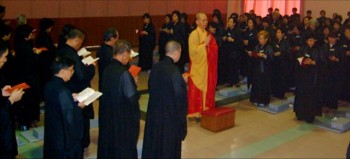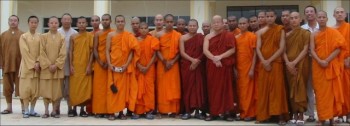Submitted by zhenliang on

The teaching that we call Buddhism today came exclusively out of the Buddha’s experience of His spiritual Awakening beneath the Bodhi tree 2,600 years ago. For all these thousand of years, Buddhism obviously has been very flexible and adoptable to any cultures it went and that is the reason behind why we have Buddhism up to today. It has always won the heart of people rather than involvement of violence. It left spellbound through its beautiful spiral teaching that was never introduced to them. But the question today arises is "how would one approach and understand that noble teaching in modern times". This might be a useful feedback even for those who regard themselves as Buddhists of long standing to cogitate upon this question.
As a matter of fact today in this highly globalized world of 21st century, isolation and utter-negligence of the situations around us have very little room. What is new today is that all the major Buddhist schools, whether Theravada, Zen, Pure Land, Tien-tai, Gelugpa, Kagyupa, Nyingmapa, and so on that once were veiled from each other for years are now popping up and interacting everywhere for the different needs of modern man. After the fall of Buddhism mainly of Nalanda in India and Vikramashila of present Bangladesh, there had not been any holistic movement of such kind of Buddhist Education as mainly these two. That is why today it is rare to find followers of one school of Buddhism knowing anything much about the teachings of other schools. I grew up with Theravadin background for instance as a novice monk in Sri Lanka so I have a good deal about it, but admittedly I knew absolutely nothing about Gelugpa or Pure Land or even Zen. In the vast majority of the cases, most of us have not even heard of them. This is the same case also for Zen or other followers or even masters who haven’t got a clue about what Theravada might be.
Today, International Buddhist College (IBC) is the East’s newest innovative centre of Buddhist studies that aims at bringing all the Buddhist schools together, and showcasing the superb beauty each prestigiously held. The college executes an amazing plan to create a newly scholarly Buddhist movement that will produce both monastic and lay scholars who would be academically well established in various areas of Buddhist studies and then be fit to teach at global scales and at the same time remaining always down to their spiritual commitments.
This was the sole dream of the very Founder of IBC, Ven. Wei Wu himself, and his colleagues, Ven. Dr. KL. Dhammajoti, Ven. Dr. Anuruddha, Dr. Karunadasa and so on and today it has in fact started to come true in some dimly form. But it is, I would say, just the beginning and unquestionably, it would be useful for every Buddhist to see and appreciate the magnificent projects, prolonged hard works and firm commitments of these great Buddhists of our times who together put every effort to make it happen especially considering the future of Buddhism and today's awesome world of confusion in the form of wisdom and compassion across the globe.
This approach will be better understood if you have read the book "The Education of Bhikkhus in Sri Lanka" by Ven. Dr. KL Dhammajoti. He stated in his book that if we talk about Buddhist education, one of the problems that immediately arise today is the education of the Sangha, i.e. the monks and the nuns with sufficient scholarly apparatus and academic qualifications, and at the same time retaining their spiritual vision and commitments. He took the opportunity to remind us that Buddhism had a missionary zeal from the beginning and the Buddha himself encouraged His four-fold disciples – Bhikkhu, Bhikkhuni, Upasaka, Upasika to be well established in the Dhamma themselves and also be capable of passing onto humanity at large for the eradication of man's existential frustration. According to the author, the fact is that today Buddhists are performing poorly in this regard and sees the situation as rather sad, because in the case of other religions – particularly Catholism and Christianity – there are internationally renowned professors and scholars who are well versed in scores of classical languages, psychology, philosophy, and able to teach even Buddhist studies and translate Buddhist canonical texts while at the same time retaining steadfast as missionaries of their faiths. On the contrary, considering the large number of Sangha members in the world, only a small proportion of them are academically qualified, and among them many even appear to have lost their missionary zeal.
IBC has taken the initiatives of that aspiration of the Buddha for his followers. Presently at IBC, there are not only monks and nuns who definitely form the majority of the students and play important roles but there are also lay students going through the same training. Life at IBC is simply beautiful, seeing how different traditions as far as students are concerned co-existing. We learn a lot even just living together. We wake up together, chant and meditate together, eat together, work together and study together. The barriers that once we previously had have now disappeared and been transformed into mutual appreciation and adoption. This is one of the sweetest joys we can get, to be around with so many beautiful friends (Kalyanamitras) and they are so encouraging in the dharma life. We hope that we will have no hassle in facing the modern audience. English is the common language we speak and it is the medium of our studies. It is not enough to be able to sit like a stone especially in front of western audience. Unlike in the east at least common people know that we are monks and nuns and we can survive in these societies, but the case is different in western cultures. What they want is how well we are expressive of our knowledge to them. Many monks and nuns have problems in getting adjusted with that society when they go to teach in the west, because they can neither speak well nor influence them greatly. So that is why what IBC does in the first place is providing intensive courses of language and communication skills besides the other prescribed subjects.
International Buddhist College is indeed a fine place of learning Buddhism and above all, it gives a sense of equality when it rejuvenates a Buddhist community by bringing in all the traditions into one central family of the Buddha.



